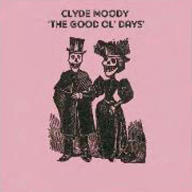Moody was born and raised in Cherokee, North Carolina, and was very influenced by the traditional mountain music he heard there. During the mid-'30s, he and Jay Hugh, the brother of Roy Hall, teamed up to appear as the Happy-Go-Lucky Boys on the radio in Spartanburg, North Carolina. They then joined Wade Mainer, and with fiddler Steve Ledford they became the Sons of the Mountaineers. Moody joined Monroe in 1940 and performed with the Blue Grass Boys at WSM and at the Grand Ole Opry. About this time, Monroe and his Boys were becoming a bluegrass band, and the changes can clearly be heard in Moody's mandolin playing on the classic "Six White Horses." A year later, Moody spent a few months in Burlington, North Carolina playing radio duets with Lester Flatt. He later returned to the Blue Grass Boys and remained with them until again attempting a solo career in 1945.
He joined the Opry as a featured artist for a few weeks and then recorded for Columbia. He had his biggest hit, the sentimental "Shenandoah Waltz," in 1947, and followed it up with a series of similar tunes such as "Cherokee Waltz" and "I Waltz Alone." He had a few more hits through the end of the decade and then moved to Washington, D.C. to work for Connie B. Gay. In 1952, Moody signed with Decca, but only had a few singles up through the mid-'50s, when his health began to fail. He left music to become a mobile home salesman, but returned in 1962 with a solo album. He then tried a modern country album. During the folk revival, he played at bluegrass festivals and moved back to Nashville in 1972, where he performed both bluegrass and country music until his death in 1989. ~ Sandra Brennan, Rovi













